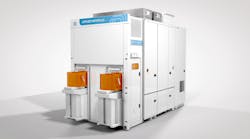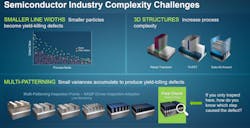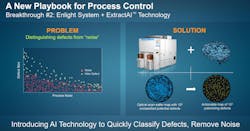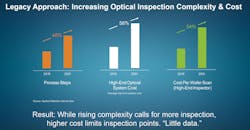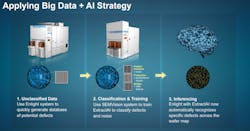Applied Materials Tools Integrate AI to Identify Defects in Chips
Applied Materials rolled out a new optical inspection system that uses big data and artificial intelligence to spot mistakes in memory and computer chips faster and more economically.
Chip-making is one of the most complex production processes in the world. To manufacture the most advanced chips, shimmering slabs of silicon travel through immaculately clean fabs for more than a thousand steps—from burning billions of transistors on blank slates of silicon to carving grooves for the interconnects and contacts—before they are finished and sliced up.
Intel, TSMC, and other semiconductor giants are locked in a race to roll out smaller, faster and more power-efficient chips for areas ranging from 5G to the data center. Applied Materials, the world's largest maker of semiconductor gear, said that success or failure increasingly depends on their ability to find and fix defects during production that can ruin chips and dampen profits.
But as the electronic components crammed on chips become smaller and smaller at every node, its customers are struggling to even locate the infinitesimal faults and flaws on chips.
The Santa Clara, California-based company is trying to address the problem with its latest process control system, called Enlight, which combines big data and artificial intelligence to serve as a "search engine" for defects. Applied Materials said it would give its customers the ability to pinpoint more of the abnormalities that can ruin advanced memory and logic chips.
Applied Materials said the Extract AI technology at the heart of the Enlight system will allow its customers to move advanced chips into volume production faster than ever and sustain higher profits over the lifetime of a node. Reducing the time it takes to get a grip on an advanced node could be worth billions of dollars to semiconductor makers like Intel, Samsung and TSMC.
Optical inspection tools are the workhorses of the fab. They are used to scan wafers at various points on the production line to locate potential problem areas. Applied Materials said Enlight has been in development for half a decade, and it takes advantage of advanced optics and high resolution to uncover more irregularities or abnormal areas on the chips. The Enlight system only takes less than a hour to plot out millions of potential flaws on the wafers.
The Enlight system is on the front lines of process control. But after it finishes its initial scan, Applied Materials said it shoots the processed slab of silicon over to its SEMVision system, which has the high resolution required to focus in on the flaws. The tool uses an electron microscope to classify defects in the crisscross grid of microscopic wiring on the chips.
These can include infinitesimal imperfections that may not interrupt the operation of the chip and "protrusions" that can impact performance or power efficiency. There are also "bridges" and "gaps" and more severe faults that can completely kill chips, what industry insiders call "killer" defects. Chip engineers can then analyze the root cause of the defects and fix them.
Applied Materials said SEMVision is the most advanced and widely used of these review systems. There are more than 1,500 of these tools on the floor at fabs around the world.
Even though the SEMVision system can more accurately identify flaws in the chips than the Enlight, the trade-off is that it is very deliberate. Applied Materials said it would take days to run through all the potential faults flagged by Enlight's first-pass optical scan, slowing down production. It would also waste time because only a fraction of the problem areas are "yield-killing" defects.
Applied Materials said Enlight uses artificial intelligence to sort out innocuous anomalies on the chips. The ExtractAI technology scans images of every product on the production line to pinpoint probable defects and rule out nuisances or false positives. Applied Materials said the AI tool can catch critical defects on the chips after checking only 1/1000 of the problem areas.
One of the most—if not the most—important metrics in the semiconductor industry today is the yield, or the fraction of chips that are not discarded during production because of defects.
For instance, Intel last year pushed out the production of central processing chips based on its 7-nanometer process by more than half a year to late 2022. The company blamed the delays on defects on the production lines, which can impact the performance of the chips or cause them to malfunction. Intel said that it was struggling to boost its yield of pristine logic chips.
Modern chip-making is one of the most expensive production processes in the world. Applied Materials said that it could cost more than $18 billion to build and equip a production plant for chips based on the 3-nanometer node, up from less than $10 billion for an industry-leading fab a decade ago. The yield of undamaged chips per slab of silicon determines success or failure.
Intel, Samsung, TSMC, and other semiconductor firms with the vast resources to manufacture chips themselves run around-the-clock operations to maximize profit over the long term. Even a short lapse in production to locate and fix a problem can cost them millions of dollars. The longer it takes them to decipher the cause of the failure, the more money they stand to lose.
According to Applied Materials, it only takes the Enlight system around an hour to plot out the potential flaws on the slab of silicon and then double-check them with its ExtractAI technology. The data is uploaded to the SEMVision system, which uses its ultra-high resolution cameras to zoom into these zones and identify the defects as protrusions, gaps, bridges or other mistakes.
That gives its customers more “actionable” insights that they can use to troubleshoot defects more effectively. Engineers can then remedy the problems to boost the productivity of the fab.
Applied Materials said the ExtractAI technology can spot mistakes on production lines in real time so that engineers can correct the problems right away. The AI technology also improves over time as it runs through more chips and diagnoses more defects. The SEMVision system trains the ExtractAI to classify faults so it takes much less time to spot mistakes in the future.
The Enlight system is currently in use at leading foundry and logic customers around the world, the company said, and more than $400 million worth have already been ordered.
Today, there are tens of billions of transistors, interconnects, and contacts densely packed in the most advanced computer chips. These features are getting smaller and smaller at every node, leaving them more vulnerable to small malformations that can ultimately ruin the chips. From generation to generation, these tiny defects also become more and more inconspicuous.
Intel and other industry giants are also grappling with more process steps. Applied Materials said the most advanced process nodes use close to 50% more steps today than it did in 2015.
That translates into more potential points of failure. There are also more possibilities for the chips to be damaged by stray contaminants. It is possible to install more checkpoints on the production line to screen chips for potential mistakes. But in a world where semiconductor tools have price tags in the tens of millions of dollars, the cost can quickly get out of hand.
Applied Materials said that at more advanced nodes its customers are rolling out chips based on 3D transistors with fin-shaped flanges (FinFETs) that are faster and waste less power than planar transistors. Intel, TSMC, Samsung, and other semiconductor giants are also preparing for the era of the gate-all-around—or nanosheet—transistor, which is even more complicated.
Applied Materials is trying to reduce the time it takes to pinpoint mistakes in these physically complicated parts using its Enlight and ExtractAI systems. Dan Hutchinson of VLSI Research, said that because ExtractAI improves the more the Enlight system is used, it could bring down quality-inspection costs for chip makers, allowing them to wring more profit out of every wafer.
By speeding up the scanning process, Applied Materials said the Enlight system enables its customers to install more checkpoints on the production line to snare potential problems on the chips early on in the process. That way, they can also anticipate potential "excursions" on the production line before they happen and halt production so that engineers can fix the bugs.
"The unique capability enables chip makers to ramp up new process nodes faster," Keith Wells, group vice president of imaging and process control at Applied Materials, said in a statement. He said the company's "new playbook for process control combines big data and AI to deliver an intelligent and adaptive solution that accelerates our customers’ time to maximum yield."
Applied Materials said Enlight is the first system in its product line that uses AI to improve the production process. But executives said that it has other AI-enhanced systems in the pipeline.
